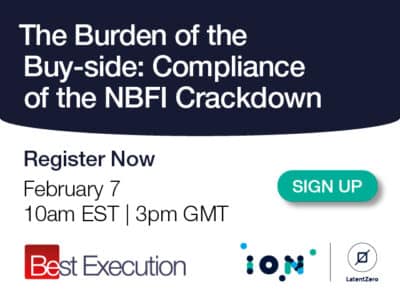
The regulatory burden is soaring for the buy-side as regulatory attention turns increasingly towards the regulation of the complex investment and funding markets that make up the area of non-banking finance intermediation (NBFI). Join Best Execution and ION Group on 7 February as we dive deep into the biggest challenges facing the buy-side right now in our exclusive webinar.
Not currently regulated by the frameworks that apply to licensed banks, the importance of these shadow banking firms has grown to the point where they now represent around 50% of global financial assets.
Unsurprisingly, therefore, regulators are raising concerns around their resilience – especially in today’s volatile post-Covid market conditions. Incidents such as the Archegos collapse, the London Metals Exchange nickel scandal and the LDI gilts crisis have shone a spotlight on the systemic risk this sector could potentially pose.
In the US, SEC chair Gary Gensler has been vocal in calling for increased oversight of hedge funds and other asset managers, and the US regulator recently passed new rules introducing significantly increased disclosure requirements for private funds (including the requirement to report risky events).
In Europe, the International Organization of Securities Commissions (IOSCO) and the Financial Stability Board (FSB) are also now working together, in a group co-chaired by the UK’s Financial Conduct Authority and the French Autorité des Marchés Financiers (AMF) to develop a set of concrete policy outcomes that could have serious implications for a wide variety of market participants: including asset managers, hedge funds, alternatives, and private markets in general. Added to the increasing complexity of ESG regulation, the challenges of data standardisation and – of course – the endless awareness of best execution – the compliance burden for the buy-side is soaring.
But with limited resources and significant existing requirements to meet, how are firms meeting this new challenge? Small to mid-size players simply do not have the same ability to meet these increasingly onerous requirements as the bigger players, and there are concerns that this could actively reduce competition. Is this compliance burden squeezing players out of the market, and how can the growth of new and innovative solutions such as compliance-as-a-service and automation platforms help them to stay in the game, freeing up their time to refocus on high value investment tasks?
What are the key features of NBFI compliance, and how should you be preparing to manage this new complexity? Register now to discover:
- The increasing regulatory and compliance challenges for NBFIs
- How firms are handling complex challenges with limited resources
- The complexity of ESG regulation
- The challenges of data standardisation
Register here: 3pm, 7 February 2024.

